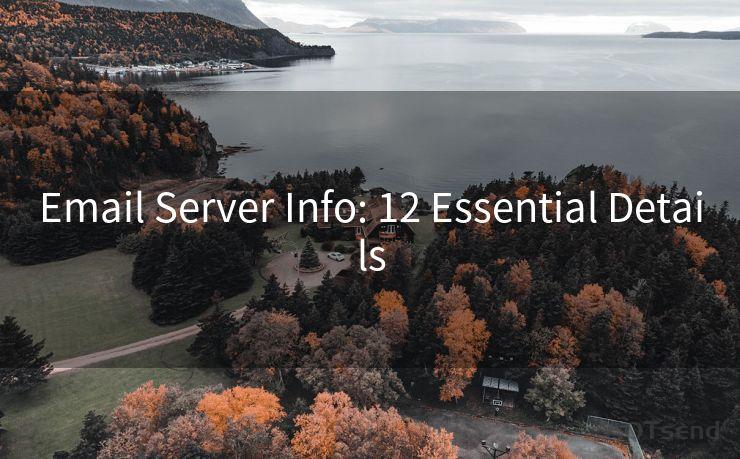Email Server Info: 12 Essential Details




When setting up or managing an email server, there are several crucial details you need to consider. These details ensure smooth and secure email communications for your organization. Here are the 12 essential details about email server information that you should know.
1. Domain Name and DNS Settings
Your email server's domain name is crucial for identifying and routing emails. Ensure your DNS settings are correctly configured to point to your email server, allowing无缝的邮件传递.
2. Server Hardware and Software Requirements
To handle the workload efficiently, your email server needs adequate hardware resources like RAM, CPU, and storage. Additionally, choose a reliable and secure email server software that meets your organization's needs.
3. Email Protocols
Understand the various email protocols like SMTP, POP3, and IMAP, which facilitate sending, receiving, and accessing emails. Configure your server to support these protocols for seamless email communication.
4. Security Measures
Implement robust security measures, including firewalls, antivirus software, and regular updates, to protect your email server from malicious attacks and data breaches.
5. Encryption
Ensure your email server supports encryption protocols like SSL/TLS to secure email transmissions and protect sensitive information from being intercepted.

6. Backup and Disaster Recovery Plan
Develop a comprehensive backup and disaster recovery plan to restore email data in case of hardware failures, natural disasters, or other unexpected events.
7. User Management
Efficiently manage user accounts, including creating, modifying, and deleting email accounts as needed. Implement strong password policies and multi-factor authentication for enhanced security.
8. Spam and Virus Filtering
Integrate spam and virus filtering mechanisms to prevent unwanted and malicious emails from reaching users' inboxes.
9. Monitoring and Logging
Set up monitoring tools to track server performance, identify potential issues, and maintain detailed logs for troubleshooting and auditing purposes.
10. Scalability and Redundancy
Design your email server infrastructure with scalability and redundancy in mind. This ensures your server can handle increasing demand and maintain high availability.
11. Compliance and Regulations
Stay compliant with relevant data protection regulations, such as GDPR or HIPAA, by implementing appropriate policies and procedures for handling sensitive email data.
12. Migration and Integration
🔔🔔🔔
【AOTsend Email API】:AOTsend is a Managed Email Service for sending transactional emails. Support Email Types: reminders, authentication, confirmations, notifications, verification codes, invoices, password resets, account activations, billing statements, two-factor authentication (2FA), and one-time passwords (OTP) emails, etc. $0.28 per 1000 Emails. 99% Delivery, 98% Inbox Rate.
You might be interested in:
Why did we start the AOTsend project, Brand Story?
What is a Managed Email API, How it Works?
Best 25+ Email Marketing Platforms (Authority,Keywords&Traffic Comparison)
Best 24+ Email Marketing Service (Price, Pros&Cons Comparison)
Email APIs vs SMTP: How they Works, Any Difference?
If you're migrating from an existing email system, plan the migration process carefully to minimize disruptions and ensure data integrity. Integrate your email server with other business applications for seamless workflow.
By considering these 12 essential details about email server information, you can establish a robust and secure email communication system for your organization. Remember to regularly review and update your email server configuration to adapt to changing business needs and evolving security threats.




Scan the QR code to access on your mobile device.
Copyright notice: This article is published by AotSend. Reproduction requires attribution.
Article Link:https://www.mailwot.com/p1260.html



